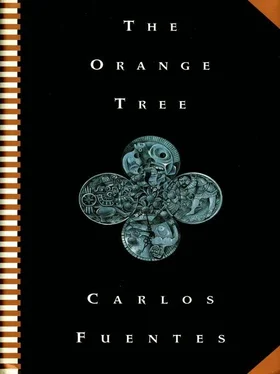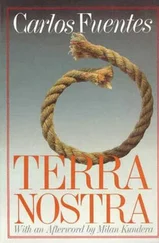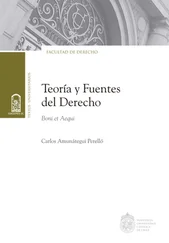With a rare display of sarcasm, our father, before he died, told me that perhaps there were two things worthwhile on that expedition. The first was discovering a new sea, a deep, mysterious gulf with water so crystal clear that from the beach it looked as if those in the water were swimming in air, except that there were myriad silver, blue, green, black, and yellow fish swiftly playing around the knees of the soldiers and sailors delighted to find that pleasant paradise. Was it an island? A peninsula? Did it really lead to the lands of Queen Calafia, Cíbola, and El Dorado? It didn’t matter, he said — for an instant it didn’t really matter. The meeting of desert and sea, the immense cactuses and the transparent water, the sun as round as an orange …
That was his other pleasure. He remembered that when he reached Yucatan, he was astonished to see an orange tree whose seeds had been brought there by the two disloyal castaways, Aguilar and Guerrero. Now my own father, humiliated by the satrap of Xalisco, the murderer Nuño de Guzmán, had to get back on his ship at the Barra de Navidad and sail to the bay of Acapulco, where he disembarked to continue to Mexico City. He had an idea. He asked the ship’s chief petty officer for some orange seeds and put a handful in his pouch. Then, on the Acapulco coast, he found a well-shaded spot and, opposite the sea, dug deep and planted those seeds.
“It will take you five years to bear fruit,” my father spoke to the orange seeds, “but the good thing is that you grow well in a cool climate, like ours, where the cold lets you sleep away the whole winter. Let’s see if here, too, in this aromatic and burned-out land, you can bear fruit. I think the most important thing, Orange Tree, is always to dig deep to protect yourself.”
Now, the perfume of the orange flowers was filtering through the window of his dying hour. It was the only gift of his broken, humiliated death …
MARTÍN 2
Just a moment now. How your vanity pains me. You see everything as a loss of dignity, a humiliation, a besmirching of nobility. Shitass criollo! Admit our father was not as astute as people say. What an incredible rash of naïveté in such a wise man! Admit what I’m saying is true, Brother Martín. Only once did his astuteness marry another astuteness. Then they were divorced, and one astuteness was left without a mate, while the other married naïveté. Very foxy, but very dumb at the same time. Why don’t you admit it? Are you afraid the flame you think you’re going to light with your filial piety will go out? Are you afraid your father will bequeath you not triumph but failure? Are you fleeing the damned and frivolous side of his fate because you’re afraid it will be yours? Don’t you prefer my frankness? Don’t you know that his imperial return to Spain with his own court and a flood of wealth confirmed the King’s suspicion that this soldier wanted to be king of Mexico? His exaggerated gifts to women infuriated their husbands. His insolence in passing without permission ahead of the grandees at Mass to sit next to the King, his impudence when he didn’t give or even sell the emeralds to the Queen: don’t you think all that chilled the King and the court, predisposing them against our father, getting their backs up? Did he keep those famous emeralds for your mother? Well, he would have been better off throwing them to the hogs. Don’t look at me like that.
MARTÍN 1
I’m leaving you, Brother. Once again, I relegate you to the third person, not even to the second in which, without your deserving it, I’ve been addressing you until now. You are not going to strip me of the desperate frankness of my speaking badly of my mother. Did you mention papers? Possessions, things, inheritance? I can accept the fact that the King, our master, granted Indians and towns to my father only to take them away bit by bit later on, taking away an Acapulco here, a Tehuantepec there … But that my mother would try to take things away from her own children … I’ve been frank. I recognize that I violated my father’s will in order to avoid the squandering of Indians and lands in the name of some senile, disorderly humanism. I didn’t know then that my own mother, Juana de Zúñiga — imperious and arrogant as she was, devoured by envy and by my father’s absences in Spain (seeking what was his by right and finding only his death), humiliated first by his abandonment and later by his demise, only too aware of his carnal weaknesses, isolated for years with six children in an Indian village like Cuernavaca, irritated by the facility with which her husband contracted debts to finance insane expeditions, maintain his houses, procure women, pay his lawyers, and meet the exorbitant sums he owed Sevillian bankers and Italian moneylenders (who wouldn’t lend money to the man who conquered Moctezuma, he of the Golden Chair?!), and insulted by my father’s will (in which he returned the two thousand ducats he received as her dowry but gave her nothing else) — would become when our father died a pitiless crow pecking at her own children.
With affection and attention, my father always overindulged the bastard daughter he had with Leonor Pizarro, the fruit of his early loves in Cuba, named simply Catalina Pizarro. Doña Juana, my mother, vented her rage especially against her, using sinister lawyers to trick her, forcing her to sign papers in which she ceded her property to my mother, and then, with the help of the hypocritical Medina Sidonia, who flattered my father so much in Seville, confining her by force to the Dominican convent of Madre de Dios, near Sanlúcar, where the poor, defenseless thing lived the rest of her days, in anguish and confusion.
All of that should have told me what my own destiny would be: when my mother, Hernán Cortés’s widow, refused to allow the executors of my father’s will into our house in Cuernavaca, having the lawyers received by her servants, refusing to allow the inventory and even less the ceding of what was mine to me. She sued me for board; for the dowries of her two daughters, my sisters Catalina and Juana, married by then to men of rank in Spain; for the lands, ever more scattered and reduced, that were part of the Marquis’s estate. She sued me for food, for dowries, for benefits from my father’s estates I had supposedly appropriated without right, for a life pension which, according to her, I was supposed to pay to a brother of hers who was a monk. She alleged that I was ten years in arrears in payments to my sisters Juana and María, two thorns from my father’s bouquet of Mexican daughters.
But my mother stripped my unfortunate sister Catalina, Hernán Cortés’s eldest daughter, of her properties in Cuernavaca, and, as I’ve said, had her locked up forever in a convent. So much for maternal love, so much for filial piety. She never trusted my generosity, which I never withdrew. She did not understand that I had to concentrate all the wealth of our family in my hands to make a strong impression on my return to Mexico after the death of my father and reestablish our fortune on a foundation of political power. Her greed and ambition transformed her into a statue. Forever on her knees, pretending to pray to God, my mother of stone lives on her knees in the House of Pilate in Seville, covered by a veil of dissimulation, peering at the world with avid, bulging eyes, her lips pursed, her jaw protruding. The old hypocrite prays with her hands joined, wearing no jewels. But even now it’s possible to hear, sounding like a reproach, the beating of the wings of a falcon, which was the only thing my father committed to her care when he died: “Madam: I implore you to take care that my falcon Alvarado be cured. You know how much I love him, and for that reason I commend him to you.” When will that falcon swoop onto the praying head of my mother? He will smash against her, poor thing. The good lady had a head made of stone. Things and papers, hard materials, inflammable paper erased by the waters of the Ocean sea: how sad … You are right, Martín, son of La Malinche. The world is made of stone: papers, water, and flames can do nothing to fight against it.
Читать дальше












